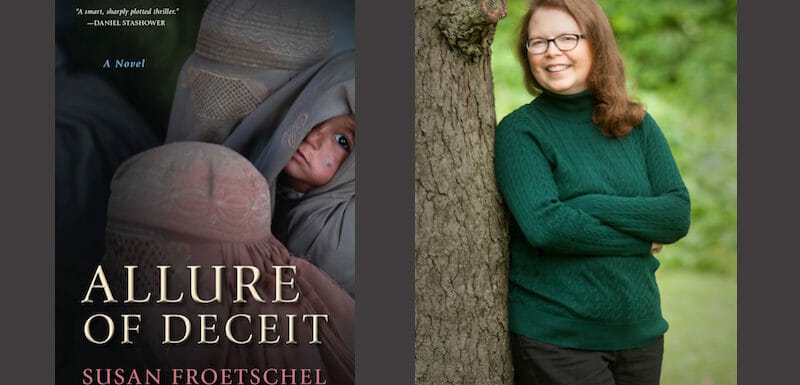 In addition to her novels, author Susan Froetschel writes for YaleGlobal Online, a public-service magazine that covers globalization. One of Froetschel’s main interests in both her work at the magazine and in her novels is charitable giving. For this interview, the author of five novels talked about her interest in charities and how that relates to her newest novel, “Allure of Deceit.”
In addition to her novels, author Susan Froetschel writes for YaleGlobal Online, a public-service magazine that covers globalization. One of Froetschel’s main interests in both her work at the magazine and in her novels is charitable giving. For this interview, the author of five novels talked about her interest in charities and how that relates to her newest novel, “Allure of Deceit.”
To begin, Froetschel described how she became interested in solving puzzles. “My mother nurtured my love for reading and stories, and I still remember cuddling by her side each night to read and talk about stories. She died soon after I turned 8.” Froetschel said that her mother’s sudden death left her wondering how to solve what she described as “life’s intractable puzzles.”
“In many ways,” said Froetschel, “I want to dispel fears about Muslims and Afghanistan. A friend of my husband’s had traveled through Afghanistan long ago. I’ll never forget his descriptions of the hospitality: extending invitations to a stranger to stay in their homes, sharing delicious meals and lively conversations. It’s hard to reconcile those descriptions with the violence in the news every day.
“My books examine families troubled by events or customs in their communities—how parents and children might work at cross-purposes, often with the same goals in mind. Parents and children may not agree, but parents do shape their children’s responses on problem-solving. Some give up, relying on bitterness and resentment; others are flexible, applying themselves with hard work and good humor.”
In “Allure of Deceit,” a remote Afghan village deals with charitable giving from US donors, a family is divided by huge sums of money and promises, leading to lies, fraud and murder.
Froetschel said, “Lying flourishes in a culture of control. Control can come in many forms, couched in anger, religious dictates or parental love. One of the easiest ways to escape unwanted controls is through lying. I remember a get-together a few years back with a best friend from childhood, and I don’t know how we got started on the conversation, but she insisted that lying was always wrong. Her insistence bothered me, maybe because I felt guilty, but I wanted to sort out types of lies and why some are worse than others.”
Froetschel noted that children are the ones most vulnerable to the policies in their communities and the decisions of their parents. “Still,” said Froetschel, “‘Allure of Deceit’ is optimistic and not bleak. The story should also remind readers about the opportunities in this country that we take for granted or overlook—the value of a good education, the ability to move freely and speak freely in our communities.
“The story offers a puzzle, one complicated by characters’ longstanding relationships – and it’s designed to test assumptions and encourage readers to develop their own perspectives about this fictional village in Afghanistan.”
For one of the characters in “Allure of Deceit,” Froetschel drew on her childhood visits to the aviary in Pittsburgh and one of her favorite attractions—a myna bird sitting on a wooden perch in a small white enclosure with a microphone that allowed exchanges with visitors. She recalls the bird repeating words like “hello” over and over, balking if the visitors spoke too much, and then shrieking or scolding as we stepped away.
Froetschel said, “Mynas are regarded as a pest in South Asia, though YouTube has lots of videos of proud owners showing off their mynas’ skills. I visited the aviary last summer but none of the staff recalled the bird. Knowing now that mynas can live up to 25 years and mate for life, I feel sorry for that caged talking bird.”
Her concerns about charity, as they relate to religion, inequality, wrongdoing and forgiveness, may stem from her education at a Catholic grade school in the Pittsburgh area. Froetschel said, “Like adults, children were expected to contribute to the weekly collection baskets, using small yellow envelopes with a line drawing of the church and a red number assigned to each child. I found one of these envelopes a few years back, my nickel still inside, and there was a rush of memories.”
The memories weren’t all pleasant. She remembered that total contributions were reviewed at the end of the year by church staff and a list of all donations posted. When Froetschel spoke with her grandfather about the posting, he told her he didn’t like the list, but being in the middle was the best place.
More information
Based in Michigan, Susan Froetschel’s novel, “Fear of Beauty,” was nominated for the 2014 Mary Higgins Clark Award and won the 2014 gold star for mystery/suspense from the Military Writers Society of America and the 2014 Youth Literature Award from the Middle East Outreach Council.
Learn more about Susan Froetschel on her website at www.froetschel.com.

